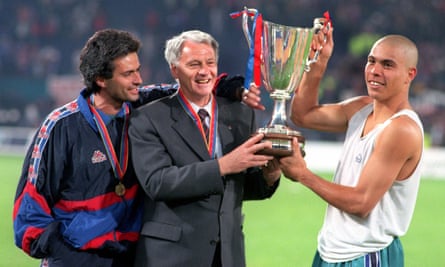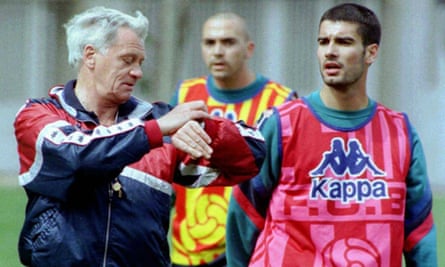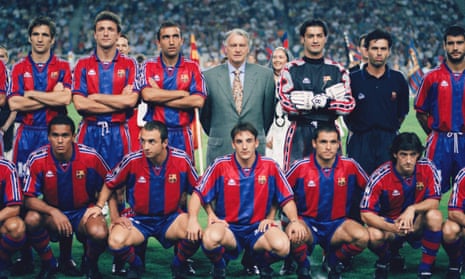Bobby Robson had turned down Barcelona twice before, once out of loyalty to Ipswich and once out of loyalty to England. The third time he was not going to miss the opportunity. He wrote in his autobiography, perhaps a little optimistically, that his past record earned him respect but the truth is that whoever had followed Johan Cruyff was facing an immensely difficult task. Cruyff, Robson admitted, “haunted my early days”.
The tendency now is to write off that 1996-97 season, to see it as a disappointing campaign largely notable for the performances of the Brazilian striker Ronaldo, who was signed from PSV Eindhoven for $20m.
Robson even suggested it was intended or at least expected he should fail, that the terms of his contract which stipulated he could be shifted into a role as director of football after a year were an indication he was regarded primarily as a post-Cruyff buffer. Yet that year brought both the Cup Winners’ Cup and the Copa del Rey, while Barça finished the league only two points behind Real Madrid, who played 14 fewer games than them that season.
The issue, supposedly, was style, although it is not clear how anybody could have followed Cruyff in that regard. “Robson was more heart,” said the Bulgarian striker Hristo Stoichkov. “He liked contact. Johan wanted to play more soccer. Robson wanted to play football but to play hard. With heart.” Certainly it’s easy to see why Robson was bewildered after his side was criticised following a 6-0 win over Rayo Vallecano. But then he never understood that side of life at Camp Nou. “It was a highly political environment and I wasn’t a political animal…” he said. “Hysteria would sweep around the ground at the smallest invitation.”
Robson’s claim that he had “embarrassed” Barça with his success is perhaps an overstatement but it certainly made it harder to bring in Louis van Gaal after one season. In the end, as the two men realised Josep Lluís Núñez [Barcelona’s president] had signed contracts with both of them, Robson in effect stepped aside and clearly enjoyed his year acting as a sort of scout-cum-ambassador. His year in charge thus became an interregnum between the two great avatars of the Total Football philosophy and that perhaps is why it tends to be overlooked.
Robson also helped nurture the tradition’s antithesis. When he arrived at Barcelona he brought with him a sharp-featured, fresh-faced, dark-haired translator. But José Mourinho was always more than a translator. The 33-year-old had been born into football. His great-uncle had been president of Vitória de Setúbal. His father, José Manuel Mourinho Félix, had been a goalkeeper. Mourinho wanted to be a player but after spells at Rio Ave, where his father was coach, Belenenses and Sesimbra, he recognised that his future lay in coaching.
That summer of 1996 Barça signed Ronaldo, who was then 19 but already one of the best strikers in the world. It was, the Dutch journalist Frits Barend suggested, a populist move to get fans back onside after Cruyff’s departure, just as Cruyff’s appointment had been a populist move following the Mutiny of Hesperia. Nonetheless, replacing Cruyff was always going to be an all but impossible job.

Robson’s geniality might have made an effective contrast but whatever doubts the players had were magnified one morning soon after he had arrived as he attempted to explain his tactics, drawing in chalk on the dressing-room floor. After Cruyff, Robson seemed very traditional and he lacked the clarity of expression of his predecessor. Mourinho took to adding supplementary, clearer instructions.
“I watched Mourinho every day for a year,” said Stoichkov. “He’s the typical guy who watches everything – changing room, bus, control. Everything. That’s the reason he has a tough character. He liked everything to be 100 per cent, in the room, good discipline, good organisation.”
Back then Pep Guardiola and Mourinho had a cordial relationship. Guardiola, for instance, intervened to protect Mourinho when the Athletic Bilbao bench swarmed towards him during a league game at San Mamés. Footage of the celebrations after Barça had won the Cup Winners’ Cup final against Paris Saint-Germain in Rotterdam, meanwhile, shows them hugging on the pitch. Perhaps in the context of winning a European trophy that means little but the way Guardiola reacts when he sees Mourinho approaching, with a point and a grin, suggests at least a measure of mutual respect and affection.
Still, there seem to have been few, if any, long and detailed debates about the game even if Mourinho did to all intents serve as a liaison between Robson and the players, in particular the so-called ‘gang of four’ – Guardiola, Luis Enrique, Sergi and Abelardo – who ran the dressing room. Guardiola, Robson said, “was a big fish. A good player too… He’d say we couldn’t play this way or we couldn’t do that – he had an opinion on everything. José saw that he was an important figure within the club and said to himself, ‘I’ve got to get in with this guy’. And he did. José and Pep were quite friendly.”
In his 2001 memoir La meva gent, el meu futbol [My People, My Football] Guardiola said the players did eventually come round to Robson’s way of thinking but that the three to four months it took was too much, that by then the title had gone and minds were made up. “The synchrony [of the thinking of Robson and the players],” he wrote, “was interpreted as self-management.”
Perhaps it was. At half-time in the 1997 Copa del Rey final against Real Betis Barça were drawing 1-1. The players wanted to focus attacks on the left side of the Betis defence and discussed their plan with Mourinho as Robson watched on. Perhaps Robson was a lame duck, or perhaps he merely encouraged players to think for themselves and managed by consensus: either way the tweak worked and Barça won 3-2 after extra time. To the end Robson remained baffled by the politics of the club. In England, he protested, he would have been “a bloody hero” for his successes in the Copa del Rey and the Cup Winners’ Cup, while the 90 points they took in the league was more than they had won in all but one season under Cruyff (making the necessary adjustment for the switch from two to three points for a win). His fate, though, had already been decided and a couple of days after the cup final, Robson was shunted aside for Van Gaal.

Núñez, having already informed Robson of his fate, told Van Gaal he was taking over at a meeting with his predecessor and his translator. “Mourinho,” Van Gaal recalled, “went out of his mind. It was not nice for Núñez and not nice for me either.”
The reason for the change was almost entirely ideological. “Robson was a typical English manager,” said Van Gaal. “He inspired his players in a certain way – he was a father for his players. He did not play like the school of Holland. He was only there one year and won three titles but in spite of that, the board of Barcelona was more indoctrinated with the vision of [Rinus] Michels and Cruyff.”
The Barcelona Legacy: Guardiola, Mourinho and the Fight for Football’s Soul by Jonathan Wilson (Blink Publishing) is out now. Order it here.
